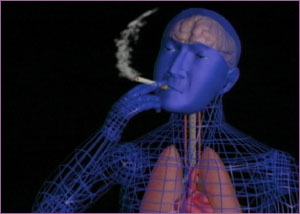by Rochelle Schwartz-Bloom and Gayle Gross de Núñez

If it weren't for nicotine, people wouldn't smoke tobacco. Why? Because of the more than 4,000 chemicals in tobacco smoke, nicotine is the primary one that acts on the brain, altering people's moods, appetites, and alertness in ways they find pleasant and beneficial. As the noted tobacco researcher M.A.H. Russell once wrote, "There is little doubt that if it were not for the nicotine in tobacco smoke, people would be little more inclined to smoke than they are to blow bubbles or to light sparklers."*
Unfortunately, as is widely known, nicotine has a dark side: It is highly addictive. Once smokers become hooked on it, they must get their fix of it regularly, sometimes several dozen times a day. Cigarette smoke contains 43 known carcinogens, which means that long-term smoking can amount to a death sentence. In the U.S. alone, 420,000 Americans die every year from tobacco-related illnesses.
Breaking nicotine addiction is not easy. Each year, nearly 35 million people make a concerted effort to quit smoking. Sadly, less than 7 percent succeed in abstaining for more than a year; most start smoking again within days.
So what is nicotine, and how does it insinuate itself into the smoker's brain and very being? Here, follow the trail nicotine blazes through the body, from mouth to brain.
Next

Rochelle Schwartz-Bloom |

Gayle Gross de Núñez |
Dr. Rochelle D. Schwartz-Bloom is a professor of pharmacology in the Department of Pharmacology and Cancer Biology, Duke University Medical Center, and president of Savantes, a company in Durham, N.C. that produces science education materials. Dr. Gayle Gross de Núñez is director of Cajal Illustration, Chicago, Illinois. The pair coproduced the video program "Animated Neuroscience and the Action of Nicotine, Cocaine, and Marijuana in the Brain," from which this piece was adapted and expanded. For information on ordering the video, contact Films for the Humanities & Sciences of Princeton, N.J. at www.films.com. |
*M.A.H. Russell, "The Smoking Habit and Its Classification, The Practitioner 212 (1974): 793.
Resources | Teacher's Guide | Transcript | Site Map | Search for a Safe Cigarette Home
Search | Site Map | Previously Featured | Schedule | Feedback | Teachers | Shop
Join Us/E-Mail | About NOVA | Editor's Picks | Watch NOVAs online | To print
PBS Online | NOVA Online | WGBH
© | Updated October 2001